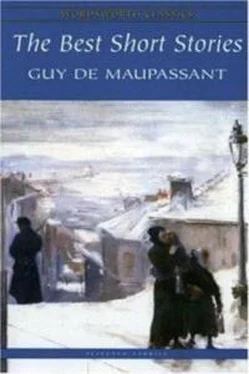The sun was beginning to burn their faces, the dust got into their eyes, and on either side of the road there stretched an interminable tract of bare, ugly country with an unpleasant odor. One might have thought that it had been ravaged by a pestilence, which had even attacked the buildings, for skeletons of dilapidated and deserted houses, or small cottages, which were left in an unfinished state, because the contractors had not been paid, reared their four roofless walls on each side.
Here and there tall factory chimneys rose up from the barren soil. The only vegetation on that putrid land, where the spring breezes wafted an odor of petroleum and slate, blended with another odor that was even less agreeable. At last, however, they crossed the Seine a second time, and the bridge was a delight. The river sparkled in the sun, and they had a feeling of quiet enjoyment, felt refreshed as they drank in the purer air that was not impregnated by the black smoke of factories nor by the miasma from the deposits of night soil. A man whom they met told them that the name of the place was Bezons. Monsieur Dufour pulled up and read the attractive announcement outside an eating house: Restaurant Poulin, matelottes and fried fish, private rooms, arbors, and swings.
"Well, Madame Dufour, will this suit you? Will you make up your mind at last?"
She read the announcement in her turn and then looked at the house for some time.
It was a white country inn, built by the roadside, and through the open door she could see the bright zinc of the counter, at which sat two workmen in their Sunday clothes. At last she made up her mind and said:
"Yes, this will do; and, besides, there is a view."
They drove into a large field behind the inn, separated from the river by the towing path, and dismounted. The husband sprang out first and then held out his arms for his wife, and as the step was very high Madame Dufour, in order to reach him, had to show the lower part of her limbs, whose former slenderness had disappeared in fat, and Monsieur Dufour, who was already getting excited by the country air, pinched her calf, and then, taking her in his arms, he set her on the ground, as if she had been some enormous bundle. She shook the dust out of the silk dress and then looked round to see in what sort of a place she was.
She was a stout woman, of about thirty–six, full–blown, and delightful to look at. She could hardly breathe, as her corsets were laced too tightly, and their pressure forced her superabundant bosom up to her double chin. Next the girl placed her hand on her father's shoulder and jumped down lightly. The boy with the yellow hair had got down by stepping on the wheel, and he helped Monsieur Dufour to lift his grandmother out. Then they unharnessed the horse, which they had tied to a tree, and the carriage fell back, with both shafts in the air. The men took off their coats and washed their hands in a pail of water and then went and joined the ladies, who had already taken possession of the swings.
Mademoiselle Dufour was trying to swing herself standing up, but she could not succeed in getting a start. She was a pretty girl of about eighteen, one of those women who suddenly excite your desire when you meet them in the street and who leave you with a vague feeling of uneasiness and of excited senses. She was tall, had a small waist and large hips, with a dark skin, very large eyes and very black hair. Her dress clearly marked the outlines of her firm, full figure, which was accentuated by the motion of her hips as she tried to swing herself higher. Her arms were stretched upward to hold the rope, so that her bosom rose at every movement she made. Her hat, which a gust of wind had blown off, was hanging behind her, and as the swing gradually rose higher and higher, she showed her delicate limbs up to the knees each time, and the breeze from her flying skirts, which was more heady than the fumes of wine, blew into the faces of the two men, who were looking at her and smiling.
Sitting in the other swing, Madame Dufour kept saying in a monotonous voice:
"Cyprian, come and swing me; do come and swing me, Cyprian!"
At last he went, and turning up his shirt sleeves, as if undertaking a hard piece of work, with much difficulty he set his wife in motion. She clutched the two ropes and held her legs out straight, so as not to touch the ground. She enjoyed feeling dizzy at the motion of the swing, and her whole figure shook like a jelly on a dish, but as she went higher and higher; she became too giddy and was frightened. Each time the swing came down she uttered a piercing scream, which made all the little urchins in the neighborhood come round, and down below, beneath the garden hedge, she vaguely saw a row of mischievous heads making various grimaces as they laughed.
When a servant girl came out they ordered luncheon.
"Some fried fish, a rabbit saute, salad and dessert," Madame Dufour said, with an important air.
"Bring two quarts of beer and a bottle of claret," her husband said.
"We will have lunch on the grass," the girl added.
The grandmother, who had an affection for cats, had been running after one that belonged to the house, trying to coax it to come to her for the last ten minutes. The animal, who was no doubt secretly flattered by her attentions, kept close to the good woman, but just out of reach of her hand, and quietly walked round the trees, against which she rubbed herself, with her tail up, purring with pleasure.
"Hello!" suddenly exclaimed the young man with the yellow hair, who was wandering about. "Here are two swell boats!" They all went to look at them and saw two beautiful canoes in a wooden shed; they were as beautifully finished as if they had been ornamental furniture. They hung side by side, like two tall, slender girls, in their narrow shining length, and made one wish to float in them on warm summer mornings and evenings along the flower–covered banks of the river, where the trees dip their branches into the water, where the rushes are continually rustling in the breeze and where the swift kingfishers dart about like flashes of blue lightning.
The whole family looked at them with great respect.
"Oh, they are indeed swell boats!" Monsieur Dufour repeated gravely, as he examined them like a connoiseur. He had been in the habit of rowing in his younger days, he said, and when he had spat in his hands—and he went through the action of pulling the oars—he did not care a fig for anybody. He had beaten more than one Englishman formerly at the Joinville regattas. He grew quite excited at last and offered to make a bet that in a boat like that he could row six leagues an hour without exerting himself.
"Luncheon is ready," the waitress said, appearing at the entrance to the boathouse, and they all hurried off. But two young men had taken the very seats that Madame Dufour had selected and were eating their luncheon. No doubt they were the owners of the sculls, for they were in boating costume. They were stretched out, almost lying on the chairs; they were sun–browned and their thin cotton jerseys, with short sleeves, showed their bare arms, which were as strong as a blacksmith's. They were two strong, athletic fellows, who showed in all their movements that elasticity and grace of limb which can only be acquired by exercise and which is so different to the deformity with which monotonous heavy work stamps the mechanic.
They exchanged a rapid smile when they saw the mother and then a glance on seeing the daughter.
"Let us give up our place," one of them said; "it will make us acquainted with them."
The other got up immediately, and holding his black and red boating cap in his hand, he politely offered the ladies the only shady place in the garden. With many excuses they accepted, and that it might be more rural, they sat on the grass, without either tables or chairs.
Читать дальше












